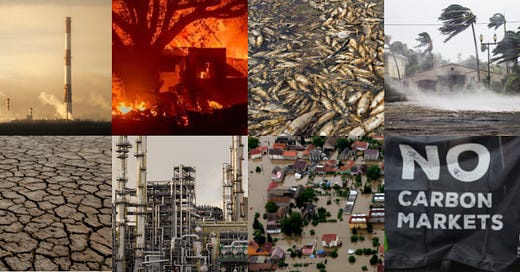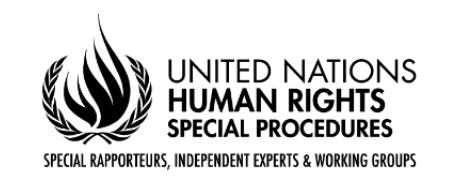UN experts expressed “serious concerns” about the gavelling through of carbon trading rules at COP29 in Baku
“After 30 years, evidence that carbon markets are contributing to mitigation or helping mobilize finance is just not there.”
Elisa Morgera is the UN special rapporteur on climate change. Special rapporteurs are human rights experts who are appointed by the UN to report on and advise on specific topics. Morgera is a professor of Global Environmental Law at the University of Strathclyde, Glasgow.
In a recent interview with The Guardian Morgera said that,
“The current climate regime was built in a way, maybe unconsciously, that locked in an ineffective approach that is blind to the disproportionate harms of climate change — and increasingly climate solutions — and the disproportionate benefits that the current situation is accruing to very few states and very few individuals.”
She added that, “some states are not acting in good faith in very clear ways”. She doesn’t list the states not acting in good faith. It would be a very long list.
More than three decades of negotiations at the UNFCCC have failed to come up with a meaningful way of addressing the climate crisis. Fossil fuel extraction continues, despite the scientific evidence that fossil fuels must be left underground.
Calls for changing the way the UN climate meetings are organised are not new. 20 years ago, after attending COP10 in Buenos Aires, I argued that it was time for a change. Things have only got worse since then. 6,000 people attended COP10. There were more than 80,000 at COP28 and more than 54,000 at COP29. More than 1,700 fossil fuel lobbyists were at COP29 — down from a record of more than 2,400 at COP28.
The signs of the COPs’ failures are all around us. Fires in California. Floods in England and the Mediterranean. Hurricanes and storms in the US and the Indian Ocean. Droughts in the Amazon and sub-Saharan Africa. Heatwaves in Europe, the Middle East, southern Africa, south and east Asia.
Last year was the warmest on record and that first year in which the average global temperature exceeded 1.5°C above its pre-industrial level.
But the most recent UN climate meeting, COP29 in Baku, failed to agree anything that would limit the burning and continuing extraction of fossil fuels. And on the first day, COP29 gavelled through the rules for Article 6.4, the global carbon trading mechanism, before the formal negotiations had even started.
Elisa Morgera and Attiya Waris, a UN Independent Expert on foreign debt published a statement condemning the decision to approve carbon markets.
Morgera told The Guardian that,
“After 30 years, evidence that carbon markets are contributing to mitigation or helping mobilize finance is just not there. I found the lack of transparency, and the overly congratulatory way that the secretariat responded, extremely problematic and a symptom of the broader issues around misinformation and disinformation.”
Here is the statement in full:
COP29: Unexpected adoption of carbon market standards in Baku raises concerns
19 November 2024
Statement by UN Independent Expert on the effects of foreign debt and other related international financial obligations of States on the full enjoyment of all human rights, particularly economic, social and cultural rights, Attiya Waris, and the UN Special Rapporteur on the promotion and protection of human rights in the context of climate change, Elisa Morgera.1
As the 29th Conference of the Parties to the UN Framework Convention on Climate Change (COP29) continues in Baku, Azerbaijan, we express serious concerns over the lack of discussion and the unexpected adoption of standards for carbon markets at the start of COP29.
We call attention to the late-night adoption, without discussion, on the first day of the UN Climate Conference (Monday, 11 November 2024) of the standards recommended by a Supervisory Body on the implementation of Article 6.4 of the Paris Agreement on carbon markets (FCCC/PA/CMA/2024/L.1). The adoption without discussion was highlighted by a State Party as a means to bypass consultations with States and therefore departing from the Paris Agreement’s party-driven process. Although negotiations on guidelines on other related topics is continuing during the 2024 UN Climate Conference, the fasttracking of this decision raises serious concerns about the prioritizing of carbon markets over other, more effective climate solutions and other pending decisions on climate finance, without the necessary transparency and due consideration of justice issues and negative human rights impacts.
There is insufficient evidence of the contribution of carbon markets to reducing greenhouse gas emissions, which raises questions about prioritizing this approach to climate mitigation as opposed to more effective ones, particularly in the context of the grossly inadequate plans to ensure a safe climate for humanity. Rather, there are founded concerns that carbon markets allow polluters to continue to pollute, while distracting from the need to address the direct causes of climate change, through phasing out of fossil fuels.
In addition, there is growing evidence that carbon markets may not generate the expected amounts of climate finance, which raises questions about the seriousness of the international community’s efforts to ensure proportionate finance to prevent foreseeable negative impacts on human rights of climate change. In addition, the UN Independent Expert on Foreign Debt has underscored need to respect the principles of accountability, responsibility, transparency, efficiency, effectiveness, fairness, and justice in any bid to provide climate finance.
Both concerns about effective action and sufficient finance are a matter of everyone’s human right to a healthy environment. In addition, there is growing evidence of carbon markets leading to a further wave of negative human rights impacts on Indigenous Peoples and peasants.
For all these reasons, the international community needs to ensure that human rights are at the forefront of the formulation and implementation of standards applicable to carbon markets. It is also imperative to keep in mind that the public has a right to access information on carbon markets with regard to credible and verifiable evidence of emission reductions; expected impacts on land, waters, nature and human rights; as well as who is benefitting economically from carbon markets; and whether credits are being used to offset preventable emissions (A/79/176). This is even more important in a global context of widespread misinformation and disinformation on climate change and its impacts on human rights that have been denounced by several UN human rights experts.
ENDS
The UN Independent Expert on the effects of foreign debt and other related international financial obligations of States on the full enjoyment of all human rights, particularly economic, social and cultural rights, and the UN Special Rapporteur on the promotion and protection of human rights in the context of climate change, as Special Procedures mandates of the United Nations Human Rights Council, serve in their individual capacity independent from any government or organization.








The topic of "gavelling through" the 6.4 rules is actually even more egregious than this report suggests - it was the work of a subsidiary committee that if legal COP rules were followed, would have to go before the larger assembly for discussion and debate. Apparently, some in the committee and or COP senior staff feared that if properly discussed, these rules would fail, so they slipped them in in an underhanded manor. That s insulting to the entire process and reduces (even further) the credibility of the COP meetings. And having now locked in these 6.4 mechanisms, which support an ineffective regime of offsets, it is very difficult to now correct the course and initiate better systems. Of course, that was the objective of the "gavelling through."